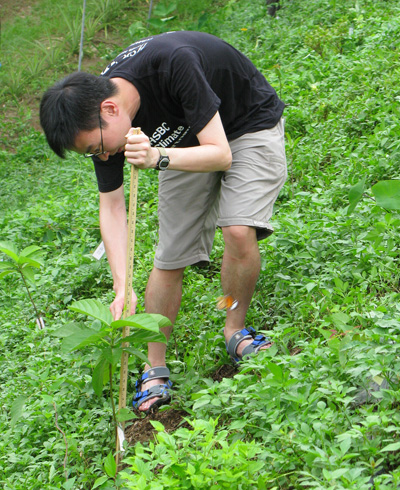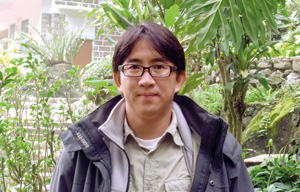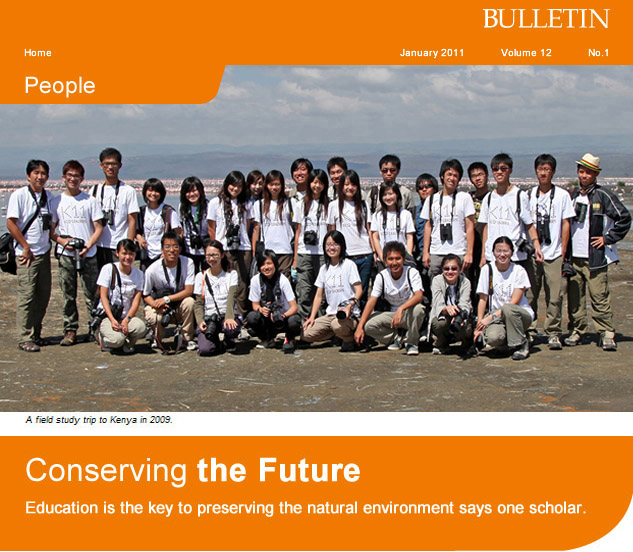 |
|
| |
|
| |
Billy Hau believes his commitment to conservation may be payback for the brutality he unleashed on a whole host of unsuspecting creatures during his youth.
Now an Assistant Professor in the School of Biological Sciences, and formerly a conservationist with the World Wide Fund for Nature Hong Kong (WWF), Dr Hau grew up in a remote rural village in the New Territories, where he thoughtlessly slaughtered snakes, tortured frogs and stole countless birds’ eggs.
“It may be because I did so many bad things in my childhood,” he says, “that I now have to spend the rest of my life protecting them,” he says, wrily.
Indeed, he believes he is one the last generation of children in Hong Kong to have grown up in a truly rural setting. “Children no longer have the opportunity to run around in the countryside, catching snakes and things like that. Young kids now go to the mall, and they don’t have time to play in the fields after school because they’re all going for private tuition or piano lessons. I think my upbringing was healthier.”
Although he’s not sure how much that influenced him his career choice, he showed an interest in conservation early on, obtaining a BSc in Environmental Life Sciences from HKU before joining WWF, in 1991, where he focused on the impact of urban development on Hong Kong’s natural environment.
“In a way I was trapped there (at WWF) because I entered a profession that fitted my personal values,” he says. “But I had to work very long hours for very little pay. On many occasions I had meetings with my boss until 11 pm and sometimes in the meetings I asked myself whether I would work such long hours if I was employed by a bank. The answer was ’possibly not’. Then I realized I was not doing the job for myself, it was for the greater good. My personality is that I need to work for something over and above my personal interest. That is my character.
“So, after that meeting I decided that I would stay in this field, and I worked for WWF from 1991–1995. That’s when I decided to do a PhD. After I graduated from the PhD, in 1998, I worked at Kadoorie Farm and Botanic Garden in Tai Po, in the New Territories, where one of my projects was to study the biodiversity of Southern China, which I did for three and a half years.”
|
| |
It was a dream job. “The Farm has a high status and a good reputation and I was spending over 200 days a year in the field in China. It was tough, but I enjoyed it.”
However, fate had something else in store for him. An opening in the then Department of Ecology and Biodiversity led Dr Hau’s former supervisor, Professor Richard Corlett, to send an email to a group of graduates asking them if they would consider returning to train the next generation of conservationists. They refused.
“We all replied saying we were happy where we were. And he got really mad. He wrote back and said when we professors in the Department retire who will teach the next generation of students? Consider the future of Hong Kong. So, the group of graduates got together and decided that I was the most suitable one to go back to teach.”
So, since 2001, Dr Hau has been coaching students and conducting research. “At first, I found it hard to believe that I had become an academic, because I still felt strongly that I was a conservationist. Well, there should be no contradiction between the two and now conservation is my ultimate goal in teaching and research.” |
|
 |
| A slope greening research project in the Climate Banker programme run by Dr Hau for HSBC staff. |
|
|
| |
Although the University is now moving towards experiential learning Dr Hau says this has always been the chosen method of teaching in Ecology and Biodiversity.
“You can’t understand what’s happening in terms of conservation if you only study books, you have to go into the real environment and study the species and see the real conflict between humans and habitat.
“We have been sending people into the field for years, it’s a major part of our programme, a major part of the way we teach.”
One lucky group of students has recently returned from a field trip to Kenya, where they conducted a project that involved writing a nature diary, documenting the species they observed and taking photographs. Their work was later exhibited at the K11 shopping mall in Tsim Sha Tsui, which sponsored the project.
What Dr Hau has seen in the last ten years is a remarkable change in the attitude towards the natural environment, particularly from large corporations. “A lot of them are trying to improve their image. We do a lot of environmental education training for organizations in Hong Kong.
“Each month I run a two-day training course for 30 staff members of HSBC. It’s basic training about how we depend on the environment and about endangered species, like certain seafood species for example. We teach them which fish to avoid in restaurants or in the market. To my surprise HSBC’s staff are very interested, we run weekend courses and their staff cannot claim this time back, they have to sacrifice their own holidays, it’s also not part of their appraisal, so it shows they are genuinely interested. We’ve received very good feedback.”
Doesn’t he ever get depressed by habitat and species loss? “This is why education is so important,” he says
|
| |
 |
|
.JPG) |
| Dr Billy Hau |
|
A field study trip at Khao Yai National Park, Thailand in 2008.
|
|
| |
|
| |
|
| |
|
| |
|
|

